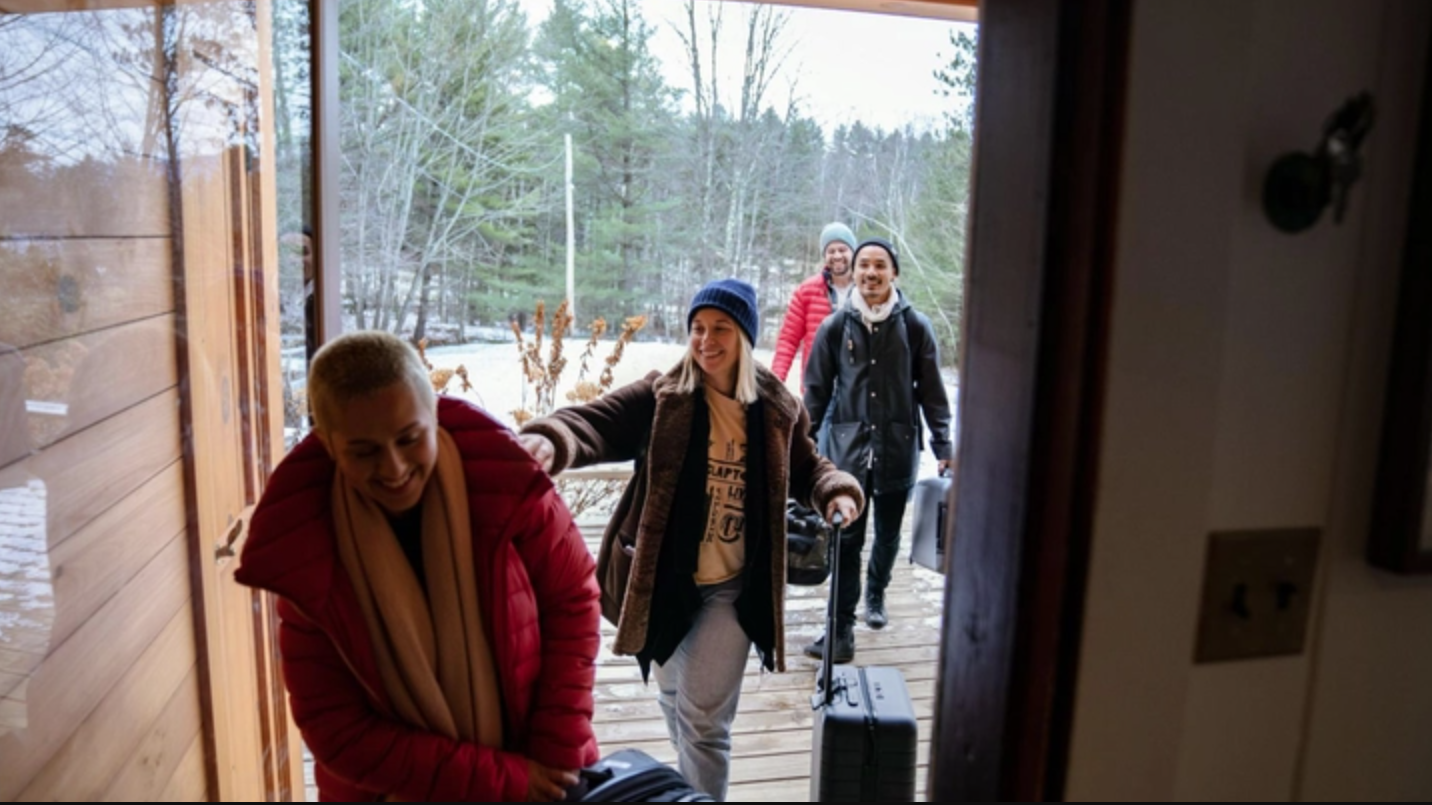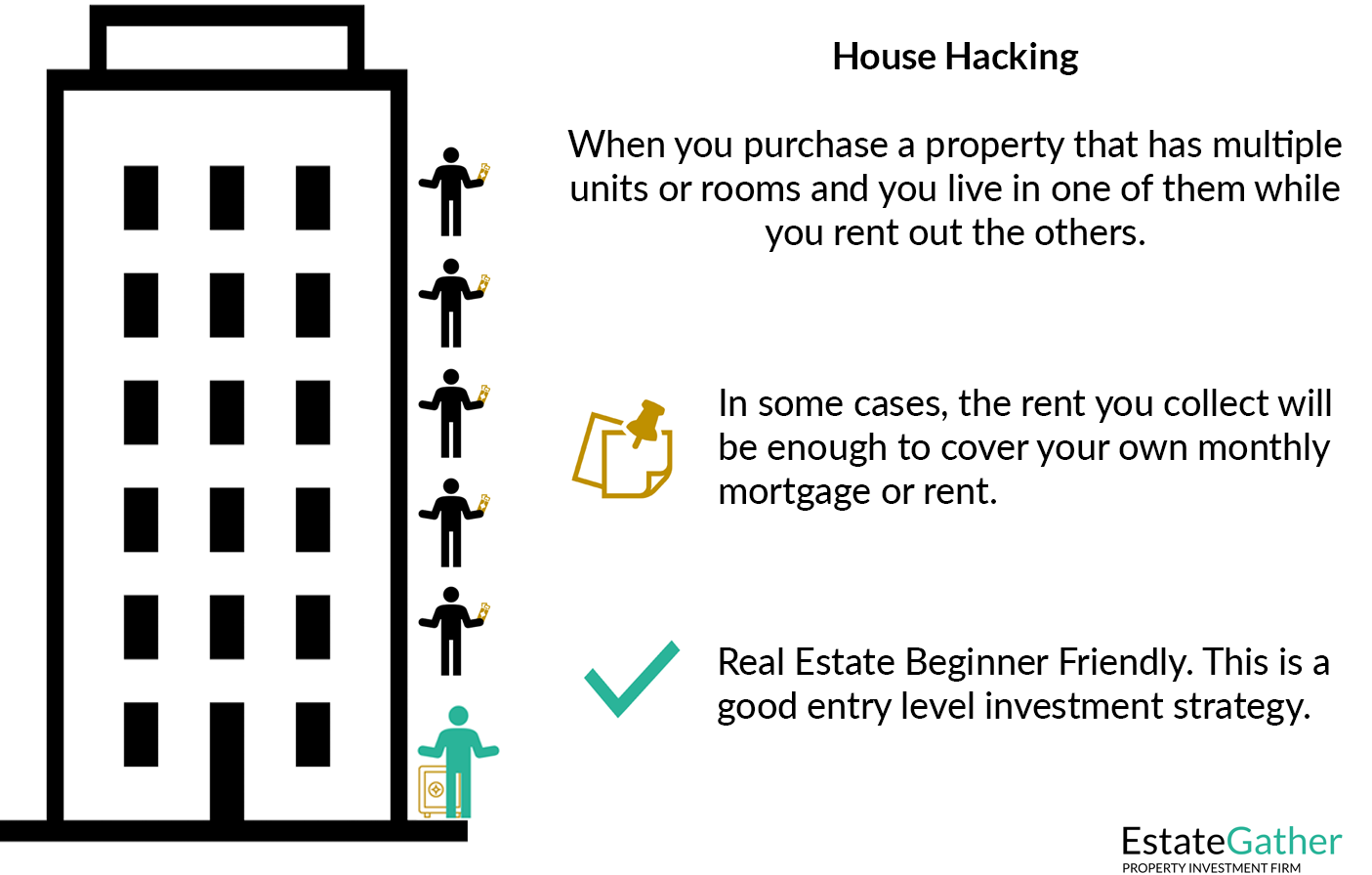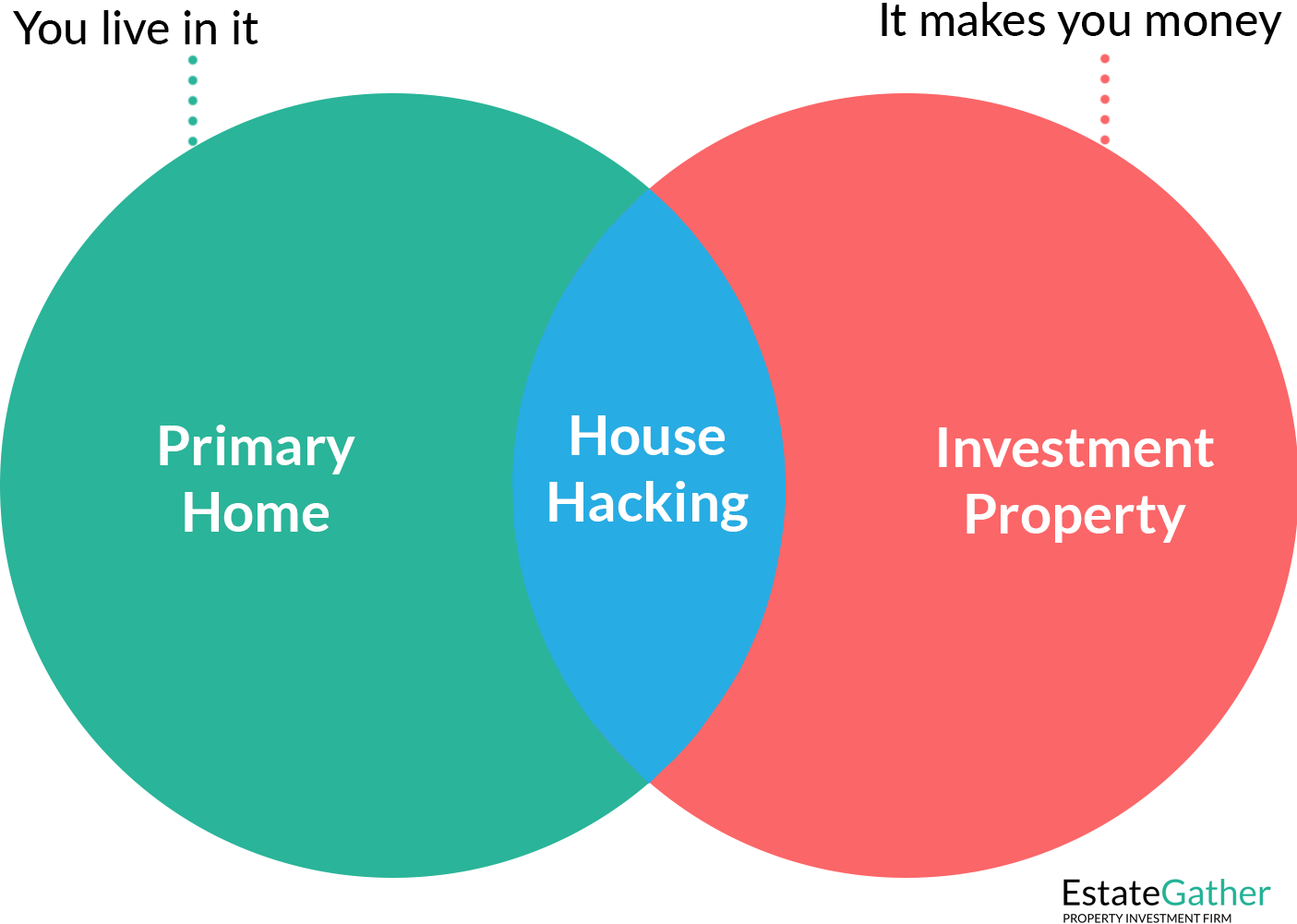
House Hacking

Cut your living costs and dive into real estate with our House Hacking guide. Learn how to live rent-free or cash-flow positive—whether you buy a duplex, convert a basement, or rent out rooms—using low-down-payment loans. Get expert tips on choosing the right location, running the numbers, screening tenants, understanding landlord laws, and preserving privacy for a smooth house hack.
House Hacking
The best strategy for beginners.
In the world of real estate investment, creativity often leads to prosperity. One such innovative strategy that has gained immense popularity in recent years is “house hacking.” This approach allows you to not only become a homeowner but also a landlord, all while significantly offsetting your living expenses. In this article, we’ll delve into the concept of house hacking, explore its various forms, and provide insights into how you can make the most of this investment strategy.
KEY TAKEAWAYS
- Definition and Core Concept of House Hacking: House hacking involves purchasing a multi-unit property, residing in one unit, and renting out the others. This strategy turns the owner into both a landlord and homeowner, allowing them to generate rental income while enjoying homeownership benefits. House hacking can include renting out rooms in a single-family home or investing in multifamily properties like duplexes, triplexes, or quadplexes.
- Variety of Forms and Adaptability: House hacking can be adapted to different types of properties. Multifamily homes are popular options, but single-family homes with rentable spaces like basements or mother-in-law suites are also viable. Another form is renting out individual rooms, which can significantly reduce living costs, especially in high-demand areas for short-term rentals.
- Key Benefits: The primary advantage of house hacking is the significant reduction or elimination of housing expenses through rental income. Additionally, it offers the opportunity to build equity in the property, provides a learning experience in real estate investment and property management, and creates an additional income stream.
- Strategies for Success: Success in house hacking involves several key strategies: choosing a property in a desirable location with strong rental demand, conducting thorough financial analysis before purchasing, carefully screening tenants, understanding and complying with local landlord-tenant laws, and planning for privacy considerations in shared living arrangements. These steps ensure a profitable and sustainable house hacking experience.
Sponsor
YOUR
ADVERTISEMENT
HERE
Just $20 a Month, for full site coverage.

What is House Hacking?
At its core, house hacking involves purchasing a property with multiple units, living in one of those units, and renting out the remaining ones. This approach effectively transforms you into both an owner and a landlord, making it possible to generate rental income while simultaneously benefiting from the perks of homeownership. What constitutes “a unit” could be as simple as renting out an unfurnished bedroom to friends or strangers. In many markets it is possible to find properties which allow for you to entirely eliminate your housing expense, granted with a few personal sacrifices being required. Like privacy!

Different Forms of House Hacking
- Multifamily Homes: These are properties that are built with multiple separate units. Duplexes, triplexes, and quadplexes are examples of multifamily homes that are commonly used for house hacking. You can reside in one of the units with your own kitchen, bathroom, living room etc., while renting out the other units. These smaller multifamily properties of four units or less are especially enticing to new investors as government loans often allow for the purchase of small multifamily properties, allowing for incredibly small down-payments, possibly even no down payment!
- Single-Family Homes with Rentable Space: If you’re not keen on the idea of sharing walls with tenants, you can still house hack with a single-family home. Look for homes with basements, mother-in-law suites, or converted garages that can be turned into rentable units.
- Room Rentals: Another variant of house hacking involves renting out individual rooms within your home. This is particularly popular in areas with high demand for short-term rentals or among homeowners looking for a more social living arrangement. This will also typically result in the highest reduction in your cost of living, as the space you are personally using is substantially reduced. While a single family home with three bedrooms may typically rent out for $1,300/month in your local area, each bedroom could yield $500 each if the home were arranged properly. This premium on renting out smaller units of space can be realized due to the large number of people that cannot afford to live entirely on their own, who also need access to common areas and possibly community items such as silverware and furniture.
PRO TIP: There’s no better way to get your start than to utilize a low down-payment government loan. You can pick up a property to house hack, and it doesn’t even need to be multifamily. You can rent out a bedroom, or rent out all of the bedrooms and live in a closet for free (or even with positive cash flow).
Benefits of House Hacking
- Reduced Housing Costs: One of the most significant advantages of house hacking is the ability to significantly reduce or even eliminate your housing expenses. The rental income generated from your tenants can cover most, if not all, of your mortgage, property taxes, and maintenance costs.
- Build Equity: As a homeowner, you’ll benefit from building equity in the property over time. This could eventually lead to substantial wealth accumulation.
- Learning Experience: House hacking provides a hands-on opportunity to learn about real estate investing, property management, and landlord responsibilities. This knowledge can be invaluable if you decide to expand your real estate portfolio.
- Income Stream: The rental income you receive from your tenants becomes an additional source of cash flow, which can be used to reinvest, pay down debt, or simply improve your quality of life.

PRO TIP: Don’t think you have to live in the property for the rest of your life! Even with the typical Government Loan, the property is only required to be your primary residence for around twelve months, absent of extenuating circumstances. After twelve months, or a life crisis, you can move out and run it as a rental!
Sponsor
YOUR
ADVERTISEMENT
HERE
Just $20 a Month, for full site coverage.

Tips for Successful House Hacking
- Location Matters: Choose a property in a desirable location with strong rental demand. Proximity to public transportation, schools, and job centers can be major selling points.
- Run the Numbers: Before making any purchase, thoroughly analyze the potential financial outcomes. Calculate your potential rental income, expenses, and cash flow to ensure a profitable venture.
- Screen Tenants Carefully: Your tenants will play a crucial role in the success of your house hacking endeavor. Screen them thoroughly to find responsible and reliable individuals.
- Understand the Law: Familiarize yourself with local landlord-tenant laws and regulations to ensure you’re in compliance with all legal requirements.
- Plan for Privacy: If you’ll be sharing a property with tenants, consider the privacy needs of all parties involved. Clearly define shared spaces and boundaries.

Conclusion
House hacking offers a unique and rewarding path to both homeownership and real estate investment. By strategically utilizing the available space within a property, you can drastically reduce your living expenses and create an income stream that contributes to your financial goals. Whether you’re a first-time investor or a seasoned pro, house hacking is a strategy well worth considering as you work towards building your wealth and securing your financial future.
Frequently Asked Questions (FAQ)
What is house hacking?
House hacking involves purchasing a property with the intention of living in one part and renting out the other parts, such as individual rooms or separate units in a multi-family home. This strategy allows the owner to reduce or eliminate personal living expenses while generating rental income.
How does house hacking reduce housing costs?
By renting out part of the property, the owner can use the rental income to cover mortgage payments, property taxes, maintenance costs, and other expenses associated with homeownership. This can significantly reduce or even eliminate the owner’s personal housing costs.
What types of properties are best for house hacking?
Popular options include multi-family homes such as duplexes, triplexes, and quadplexes, where the owner can live in one unit and rent out the others. Single-family homes with rentable features like finished basements, detached garages, or accessory dwelling units (ADUs) are also viable for house hacking.
What are the financial benefits of house hacking?
The main benefits include reduced personal living costs, the ability to build equity in a property, potential property appreciation, and the creation of an additional income stream from rental payments.
What should I consider when choosing a property for house hacking?
Key considerations include the location’s rental demand, proximity to amenities and public transportation, the layout and condition of the property, and the potential for positive cash flow after accounting for all expenses.
How can I finance a house hacking property?
House hacking properties can often be financed with conventional mortgages, FHA loans (which allow for lower down payments), or other government-backed loan programs designed for multi-family properties.
Are there any tax benefits to house hacking?
Yes, house hacking can offer various tax deductions, including mortgage interest, property taxes, and expenses related to renting out part of your property, such as maintenance and repairs, advertising for tenants, and professional services like property management and legal advice.
What are the challenges of house hacking?
Challenges may include the responsibilities of being a landlord, such as finding and managing tenants, dealing with maintenance issues, and ensuring compliance with landlord-tenant laws. Additionally, living in close proximity to your tenants may require compromises on privacy and personal space.
How do I manage the relationship with tenants in a house hack?
Effective tenant management involves thorough screening processes, clear and enforceable lease agreements, regular communication, and a proactive approach to maintenance and repairs. It may also be beneficial to set boundaries and rules for shared spaces to ensure a harmonious living environment.
Can house hacking lead to long-term wealth building?
Yes, house hacking can be an effective strategy for building long-term wealth. It allows investors to acquire property with potentially lower out-of-pocket costs, generate passive income, and benefit from property appreciation over time.
Is house hacking suitable for first-time homebuyers?
House hacking can be an excellent option for first-time homebuyers, as it provides an opportunity to own a home while mitigating some of the financial burdens through rental income. Government-backed loans that offer lower down payments and are open to first-time buyers can make this strategy particularly accessible.
How long do I need to live in my house hacking property?
Typically, if you use a government-backed loan like an FHA loan, you are required to live in the property as your primary residence for at least one year. After this period, you may move out and rent out the unit you were living in, turning the property into a full investment property.

